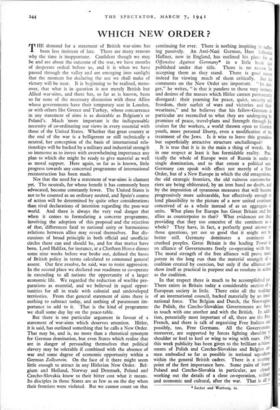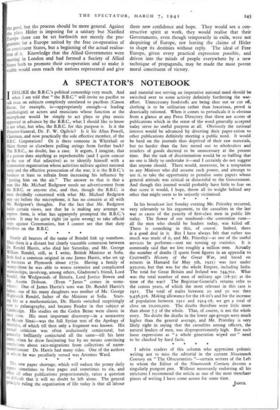WHICH NEW ORDER?
THE demand for a statement of British war-aims has been less insistent of late. There are many reasons why the time is inopportune. Confident though we may be and are about the outcome of the war, we have months of desperate ordeal before us, and it is when we have passed through the valley and are emerging into sunlight that the moment for declaring the use we shall make of victory will be near. It is beginning to be realised, more- over, that what is in question is not merely British but Allied war-aims, and there has, so far as is known, been so far none of the necessary discussion with those Allies whose governments have their temporary seat in London, or with others like Greece and Turkey, whose concurrence in any statement of aims is as desirable as Belgium's or Poland's. Much more important is the indispensable necessity of co-ordinating our views in every essential with those of the United States. Whether that great country at the end of the war is a belligerent or still technically a neutral, her conception of the basis of international rela- tionships will be backed by a military and industrial strength so immense as to invest with overwhelming importance any plan to which she might be ready to give material as well as moral support. Here again, so far as is known, little progress towards any concerted programme of international reconstruction has been made.
Not that the need for a statement of war-aims is clamant yet. The neutrals, for whose benefit it has commonly been advocated, become constantly fewer. The United States is not to be counted as an ordinary neutral, and Spain's course of action will be determined by quite other considerations than rival declarations of intention regarding the post-war world. And there is always the very real danger that when it comes to formulating a concrete programme, involving the adoption of this proposal and the rejection of that,' differences fatal to national unity or harmonious relations between allies may reveal themselves. But dis- cussions of broad principle in both official and unofficiat circles there can and should be, and for that matter have been. Lord Halifax, for instance, at a Chatham House dinner some nine weeks before war broke out, defined the bases of British policy in terms calculated to command general assent. Our first resolve, he said, was to resist aggression. In the second place we declared our readiness to co-operate in extending to all nations the opportunity of a larger economic life. We regarded the reduction of warlike pre- parations as essential, and we believed in equal oppor- tunities for all in trade with colonial and undeveloped territories. From that general statement of aims there is nothing to subtract today, and nothing of paramount im- portance to add to it. That is the kind of programme we shall some day lay on the peace-table.
But there is one particular argument in favour of a statement of war-aims which deserves attention. Hitler, it is said, has outlined something that he calls a New Order. That may be, and is, no more than a rhetorical synonym for German domination, but even States which realise that are in danger of persuading themselves that political slavery may be tolerable if combined with the absence of war and some degree of economic opportunity within a German Zollverein. On the face of it there might seem little enough to attract in any Hitlerian New Order. Bel- gium and Holland, Norway and Denmark, Poland and Czecho-Slovakia know to their bitter cost what it means. Its disciples in those States are as few as on the day when their frontiers were violated. But we cannot count on that continuing for ever. There is nothing inspiring in suffer. ing passively. An Anti-Nazi German, Herr Sebastian Haffner, now in England, has outlined his plans for an Offensive Against Germany* in a little book ju,t published under that title. There is no reason for accepting them as they stand. There is good reason indeed for viewing much of them critically. But his comments on the New Order are important. "Its dan- ger," he writes, "is that it panders to those very instincts and desires of the masses which Hitler cannot permanentls disregard: their yearning for peace, quiet, security and freedom, their surfeit of wars and victories and their weariness," and he believes that his fellow-Germans in particular are reconciled to what they are undergoing by promises of peace, travel-plans and Strength through Jos cruises for the workers, a world thrown open to German youth, more personal liberty, even a modification of the treatment of the Jews. Is it wise to leave this grandiose but superficially attractive structure unchallenged?
It is true that it is in the main a thing of words. But in one respect at least it has formidable reality. Prac- tically the whole of Europe west of Russia is under a single domination, and to that extent a political unit. Germany can speak with effect not merely of a New Order, but of a New Europe in which the old antagonisms. the old strategic frontiers, the old ruinous customs-bar- riers are being obliterated, by an iron hand no doubt, and by the imposition of tyrannous measures that will become progressively more unbearable, but effectively enough to lend plausibility to the picture of a new united continent conceived of as a whole instead of as an aggregate ol units. What plans for Europe has Great Britain and her allies as counterpoise to that? What evidences are they providing that they too conceive of the continent as a whole? They have, in fact, a perfectly good answer to those questions, yet not so good that it might not be better still. Germany dominates a continent 01 crushed peoples. Great Britain is the leading Power in an alliance of Governments freely co-operating with her. The moral strength of the free alliance will prove more potent in the long run than the material strength of 3 coalition created by coercion, but only if the alliance can show itself as practical in purpose and as resolute in action as the coalition.
In that respect there is much to be accomplished yet There exists in Britain today a considerable section of European society in little. There exist all the makings of an international council, backed materially by an inter- national force. The Belgian and Dutch, the Norwegian. the Polish, the Czecho-Slovakian Governments are here. in touch with one another and with the British. In add?: lion, potentially most important of all, there are the Free French, and there is talk of organising Free Italians ani possibly, too, Free Germans. All the Governments. moreover, are supported by forces fighting shoulder 10 shoulder or keel to keel or wing to wing with ours. 01111Y this week publicity has been given to the brilliant aclue ments of Polish and Czecho-Slovakian and Belgian air' men embodied so far as possible in national squadMI5 within the general British cadres. There is a starting- point of the first importance here. Some pairs of States. Poland and Czecho-Slovakia in particular, are alreacIF working out the details of a close co-operation, militarY and economic and cultural, after the war. That is all le
* Secker and Warburg, zs.
the good, but the process should be more general. Against the plans Hitler is imposing for a unitary but Nazffied Europe there can be set forthwith not merely the pro- gramme for a Europe united by the free co-operation of its constituent States, but a beginning of the actual realisa- tion of it. Knowledge that the Allied Governments were meeting in London and had formed a Society of Allied States both to promote their co-operation and to make it visible would soon reach the nations represented and give them new confidence and hope. They would see a con- structive spirit at work, they would realise that their Governments, even though temporarily in exile, were not despairing of Europe, nor leaving the claims of Hitler to shape its destinies without reply. The ideal of Free Europe, given every practical expression possible, and driven into the minds of people everywhere by a new technique of propaganda, may be made the most potent moral constituent of victory.































 Previous page
Previous page